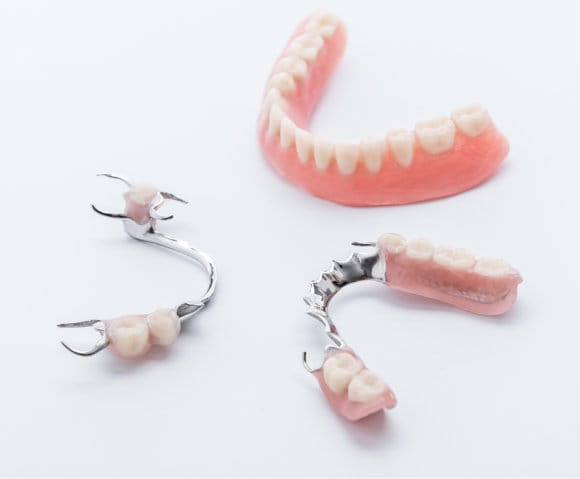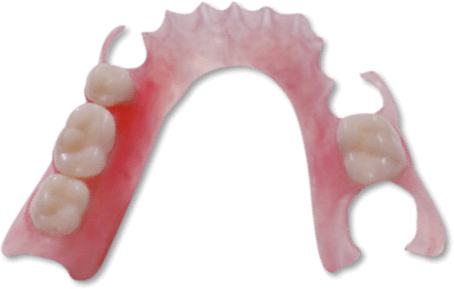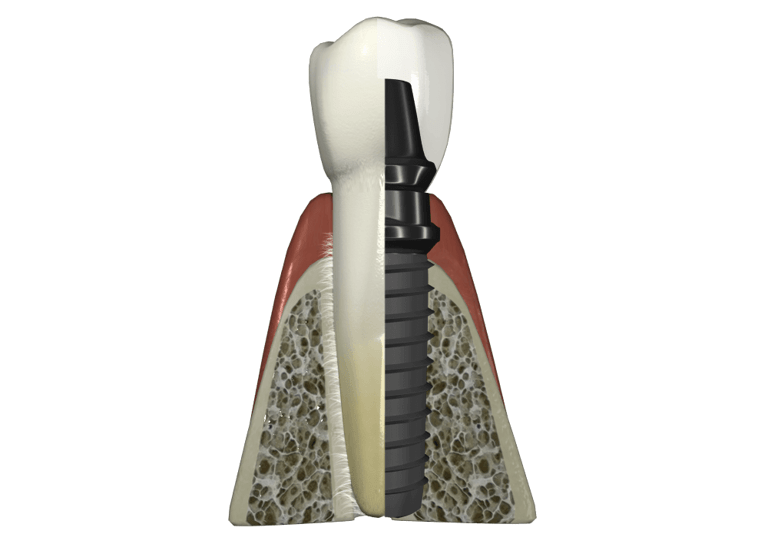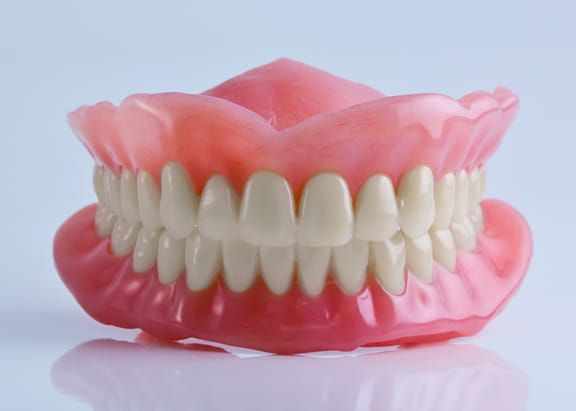Partial Dentures
Partial Dentures
Removable partial dentures are composed of a metal framework with plastic teeth and gum areas. The framework includes metal clasps or other attachments, which hold the denture in place. Partial dentures are removed easily for cleaning.
Clasps are C-shaped, I-shaped, and Y-shaped parts of the denture framework that fit around neighboring natural teeth. These teeth may require shaping to help hold the clasps and keep the denture securely in place.
Why A Partial Denture?
A partial denture may not be the best option for replacing missing teeth but it is the least expensive tooth replacement option when compared to a dental bridge or a dental implant.
Benefits include:
- Restore some biting and chewing ability
- Better speech and pronunciation vs. having no teeth
- Restore physical changes in your face, mouth and lips that were present without teeth
- Bring back a more attractive appearance when smiling

Flexible Partial Dentures
Flexible partials are very comfortable. They are made from the latest technology in thermoplastic resins.
Depending upon your condition, flexible partials may be all thermoplastic or they may be combined with Vitallium bio-compatible metal for increased strength.

Precision Partials
Precision partial dentures are retained in the mouth by interlocking components. A specially shaped extension of the partial fits snugly into or onto a receiving area or projection of a natural tooth that has been crowned. This makes for anti-slip dentures that won't move or come out when you speak or chew.
Temporary Partials
Temporary or interim appliances serve many useful purposes and are often an integral part of a prosthetic treatment plan. These appliances can be designed to be either fixed or removable. This simple appliance is excellent for temporary replacement of front teeth while the patient is waiting for a permanent bridge, a partial, or implants. This removable interim bridge is made of a clear vacuum-formed material. The appliance simply snaps into place.
How Much Do Partial Dentures Cost?
Generally speaking, partial dentures are extremely affordable and cost less than other forms of tooth replacement such as a dental implant. However, the benefits and better quality of life dental implants bring is something most patients choose when replacing their teeth.
The actual cost of a partial denture depends on your specific needs and materials used. The best way to receive an accurate quote on a partial denture is to request an appointment or call us at (916) 365-9262 and come in to be evaluated. All it takes is a single visit so come see us soon!

Alternatives To Partial Dentures
Partial dentures are not the only means of replacing a missing tooth.
Below are two other tooth replacement options that will outlast a partial denture and provide a more durable solution.
Dental implants are a permanent alternative to partial dentures and bring additional benefits that dentures cannot provide and will outlast normal dentures even under optimal conditions. Dental implants will actually replace the entire tooth (the tooth root as well as the crown) which eliminates bone deterioration and brings the same strength and durability as your original tooth.Fixed bridges are another tooth replacement option that are typically more durable and a more permanent solution than denture arches. A bridge spans the length of at least three teeth to replace a missing tooth or teeth in between. Bridges are cheaper than dental implants but do not offer all the same benefits when compared to replacing a missing tooth with an implant.

The Cons of Partial Dentures
Partial dentures are the cheapest form of replacing an entire arch of teeth but they are not necessarily the best option. Here are a few downfalls that occur in nearly every situation when it comes to partial dentures:
Adjustments & Re-fitting & Replacement
Throughout your lifetime, dentures will need to be replaced and adjusted which can become time consuming and expensive. It is a simple fact that dentures start to become loose and can break through normal activities such as talking, eating, etc. If a denture arch breaks, it may be possible to repair but in some cases it will need to be replaced entirely.
Bone Resorption (degeneration)
If you do not replace tooth roots, the bone where the tooth roots used to be will start to degenerate and shrink. This not only means you'll need to get your dentures re-adjusted but it also means dental implants become less and less of a future option to replace teeth due to the amount of bone required to place the implant becomes less and less.
Impaired Speech
Partial dentures take up more space in the mouth than your normal teeth. Because of this, there is an adjustment period of time where you may notice difficulty in pronouncing certain words or talking in general. As dentures get re-adjusted and re-fitted, you may notice a difference in pronunciation and will have to make minor speech adjustments again.
Bulky & Uncomfortable
Dentures are typically not associated with comfort and although today's technology has made wearing partial dentures more manageable, as you speak and chew, dentures exert their forces onto the gum bed below and tend to cause soreness to these sensitive tissues. Additionally, the bulk of having a denture in your mouth can cumbersome.
Denture Instructions
Occasionally, it is difficult to adapt to full or partial dentures. At first they may feel loose, bulky and awkward while speaking. For a quicker adjustment period, follow these instructions:
- At first, wear your dentures all the time.
- Do not use adhesive unless Reflections Family Dentistry advises you to do so.
- You should remove your dentures when you go to sleep.
- After removing dentures, clean with a toothbrush and place in a bowl of water. They can be soaked in a commercial denture cleanser, but brushing them is essential.
- Any signs of "sore spots," discomfort, or looseness that is causing you difficulty should be brought to our attention.
Never adjust the dentures yourself. Every person and every mouth is different; therefore, adjustment periods will vary.
Please remember that it will take time for you to become completely comfortable with your new teeth.

Denture Resorption
Within 6 months of starting to wear a denture, you will have already lost about 40% of your jawbone structure.
If you have worn a denture for a few years, you already know about bone loss. The reason your denture doesn't fit like a year ago, is that you don't have the same jawbone structure to support it.
If you wear a partial denture, beware that you will have the same problem with bone loss.
Once the jaw bone structure is lost your options become limited. A dental implant is the logical choice to help stop bone loss, however, once the jaw bone structure is lost, your options become limited.
